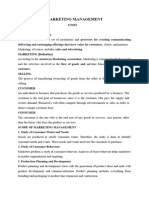0% found this document useful (0 votes)
64 views2 pagesMKT 100 - Assignment Week 1
This document contains an assignment for a marketing course. It asks the student to answer 5 questions about marketing fundamentals. The questions cover definitions of marketing, the 5 alternative concepts of marketing management orientation, 10 types of products that can be marketed with an example for each, the 5 core customer and marketplace concepts, and a definition and example of marketing myopia.
Uploaded by
Cyrle JuanicoCopyright
© © All Rights Reserved
We take content rights seriously. If you suspect this is your content, claim it here.
Available Formats
Download as DOCX, PDF, TXT or read online on Scribd
0% found this document useful (0 votes)
64 views2 pagesMKT 100 - Assignment Week 1
This document contains an assignment for a marketing course. It asks the student to answer 5 questions about marketing fundamentals. The questions cover definitions of marketing, the 5 alternative concepts of marketing management orientation, 10 types of products that can be marketed with an example for each, the 5 core customer and marketplace concepts, and a definition and example of marketing myopia.
Uploaded by
Cyrle JuanicoCopyright
© © All Rights Reserved
We take content rights seriously. If you suspect this is your content, claim it here.
Available Formats
Download as DOCX, PDF, TXT or read online on Scribd
/ 2






















































































